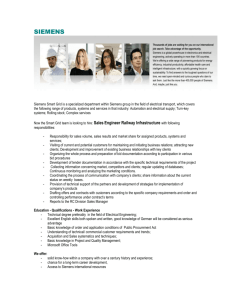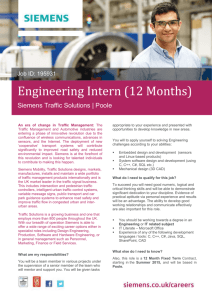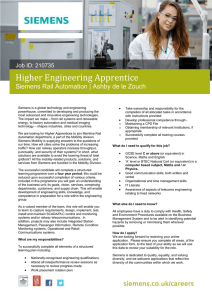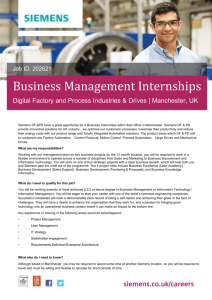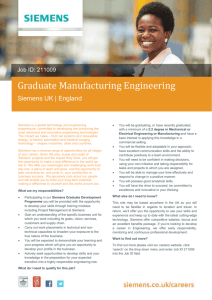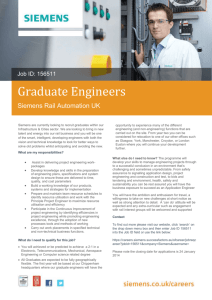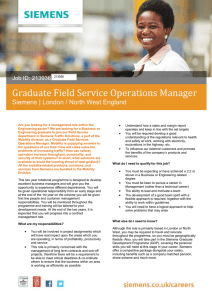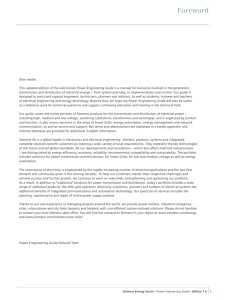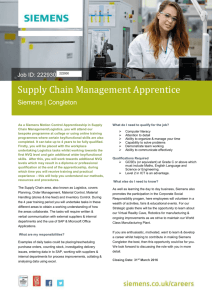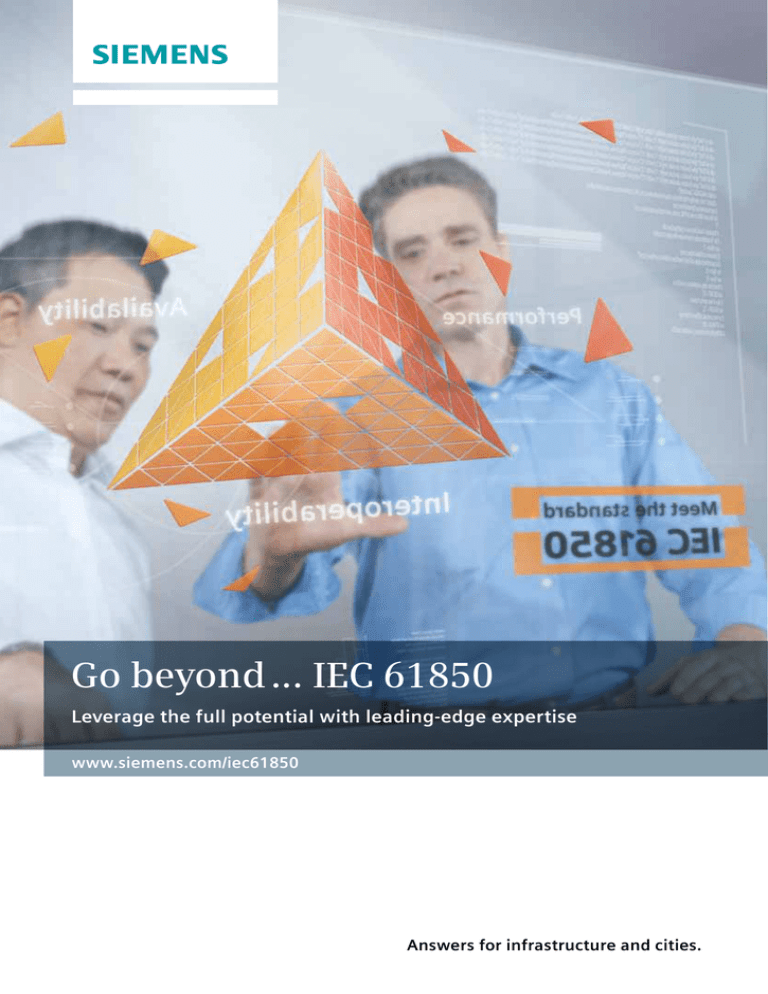
Go beyond ... IEC 61850
Leverage the full potential with leading-edge expertise
www.siemens.com/iec61850
Answers for infrastructure and cities.
Bank on the expertise
of the technology leader
The IEC 61850 standard is more than just an
Ethernet-based substation automation protocol.
It comprehensively defines the engineering p
­ rocess,
data and service models, the conformance test, and
the entire communication within substations.
IEC 61850 has become firmly established in the
field of substation automation. With Edition 2,
its advantages now become available to other
fields of the energy supply business.
Performance
with a
perspective
Interaction
without limits
R
eliable and comprehensive protection of
investment, even with migrations
Targeted use of the various services in
the IEC 61850 framework
Compatibility of Editions 1 and 2
Support of user profiles
This advantage of experience is incorporated into
all Siemens solutions and products. They set the
benchmark when it comes to performance,
inter­operability, and availability. They make the
entire workflow easier, deliver a safety and security
advantage, and ultimately save real money.
Siemens offers users the possibility to draw maximum
benefits from IEC 61850. Discover what it means to
tap the full potential of the IEC 61850 standard.
O
ptimal support of individual operating
requirements and system architectures
Ready for the Smart Grids of the future
Only a consistently designed implementation of the
IEC 61850 standard makes it possible to reap its full
benefits. This is where Siemens’ applied technology
leadership pays off: Siemens is the d
­ riving force
behind this standard – no one knows its entire
potential better.
Siemens participates in most standardization
bodies and user groups on the international stage
and has the largest installed base worldwide: more
than 200,000 Siemens devices with IEC 61850 are
in operation around the globe.
Easier station engineering and operation
Seamless adaptation to existing systems
À la carte
availability
Scalable solutions enable individual
adaptation of availability
C
omprehensive redundancies for reliable
data transmission at any time
Support of PRP, HSR, and RSTP protocols
Bank on the expertise
of the technology leader
There are plenty
of benefits for you
Top: SIPROTEC 5
Middle: experimental setup for interoperability test
The IEC 61850 standard is more than just an
Ethernet-based substation automation protocol.
It comprehensively defines the engineering p
­ rocess,
data and service models, the conformance test, and
the entire communication within substations.
IEC 61850 has become firmly established in the
field of substation automation. With Edition 2,
its advantages now become available to other
fields of the energy supply business.
Only a consistently designed implementation of the
IEC 61850 standard makes it possible to reap its full
benefits. This is where Siemens’ applied technology
leadership pays off: Siemens is the d
­ riving force
behind this standard – no one knows its entire
potential better.
Siemens participates in most standardization
bodies and user groups on the international stage
and has the largest installed base worldwide: more
than 200,000 Siemens devices with IEC 61850 are
in operation around the globe.
This advantage of experience is incorporated into
all Siemens solutions and products. They set the
benchmark when it comes to performance,
inter­operability, and availability. They make the
entire workflow easier, deliver a safety and security
advantage, and ultimately save real money.
Solutions from Siemens unleash untapped potential.
They make the complex IEC 61850 data model easily
manageable by translating it into your common user
language. Individual operating requirements and
­system architectures are optimally supported.
Engineering
The Siemens experts ensure that the IEC 61850standard representations always correspond to the
actual function of the device. This makes possible
an integrated and consistent device and system
Solutions from Siemens increase your systems‘­
­integration capacity. Flexible object modeling
and communication services, as well as degrees of
freedom of object addressing, ensure the highest
­possible degree of interoperability as well as
­efficiency in daily operation, equipment replacement,
and system expansions – independent from specific
manufac­turers and with little planning effort.
Protection of investment
Investments are reliably protected in the case of
­system and functional expansions and even
­ ngineering from the single line of the station to
e
device para­meterization – comfortable to manage,
time-saving, and reliable during engineering and
­station operation.
Security
Today, reliable performance requires the utmost
­security. The architecture of Siemens energy
­automation systems fulfills the strict security
­requirements of the BDEW (German Association of
Energy and Water Industries) whitepaper and the
­ igrations. It goes without saying that all Siemens
m
devices are KEMA-certified as level A devices according
to UCA (Utility Communication Architecture) and
have passed the interoperability test of FGH (research
­association of the electricity supply industry and
­electrical industry).
Edition 2
Siemens has played an active role in the definition
of the new Edition 2 and contributed its vast field
­experience. Both editions can be integrated
NERC CIP (North American Electric Reliability
­Corporation ­Critical Infrastructure Protection)
­standard. The entire ­communication line between
the ­parameterization tool and the terminal equipment
is encrypted, the communication between station
control and control center protected according to the
IEC 62351 standard. Moreover, all access attempts
and critical actions to devices and systems are logged
automatically. This multilayered concept of security
ensures reliable operation and the highest possible
availability at any time.
s­ imultaneously in Siemens station control systems –
fully adapted to your individual operating requirements.
Smart Grid-ready
IEC 61850 with Siemens means that your systems
already fulfill the demands of future Smart Grids
today: They enable the reliable and standardized
data exchange among all grid elements – from the
charging station for electric vehicles all the way to
the high-voltage power transmission system.
Siemens offers users the possibility to draw maximum
benefits from IEC 61850. Discover what it means to
tap the full potential of the IEC 61850 standard.
Solutions from Siemens make it possible to adapt
the availability factor of a station individually.
­Redundancy protocols and functional redundancies
implemented with SICAM and SIPROTEC devices
ensure the safe transmission of all data – because
­reliable data communication is the basis of all
­automation tasks and, thus, for the operational
safety of a substation.
Redundancy
Whether buffered or unbuffered reporting,
or ­redundant uninterruptible and lossless data
­transmission with PRP (Parallel Redundancy Protocol)
and HSR (High-availability Seamless Ring Redundancy):
S­iemens station control systems support all operating
requirements and system architectures in an optimal
manner.
Field experience
Today, more than 200,000 Siemens devices are in
­operation worldwide in stations with RSTP (Rapid
­Spanning Tree Protocol). The necessary interoperability
test of the Siemens devices for HSR was performed and
passed during CIGRE 2010.
The SICAM and SIPROTEC range of devices
Published by and copyright © 2012:
Siemens AG
Infrastructure & Cities Sector
Smart Grid Division
Energy Automation
Humboldtstrasse 59
90459 Nuremberg, Germany
For more information, please contact
our Customer Support Center.
Phone: +49 180 524 84 37
Fax:
+49 180 524 24 71
(Charges depending on provider)
E-mail:support.energy@siemens.com
Order No. E50001-G720-A341-X-4A00
Printed in Germany
Dispo 06200, c4bs No. 7437
fb 4367 WÜ WS 03121.0
Printed on elementary chlorine-free
bleached paper.
All rights reserved.
Trademarks mentioned in this document
are the property of Siemens AG, its affiliates,
or their respective owners.
Subject to change without prior notice.
The information in this document contains
general descriptions of the technical options
available, which may not apply in all cases.
The required technical options should therefore
be specified in the contract.

